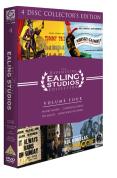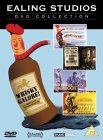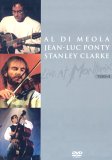![The Dambusters [1954]](/pictures/1000576.jpg) The Dambusters | DVD | (18/04/2005)
from £11.32
| Saving you £1.67 (14.75%)
| RRP
The Dambusters | DVD | (18/04/2005)
from £11.32
| Saving you £1.67 (14.75%)
| RRP Something of a cult item among British war movies (and brilliantly spoofed a few years back by a lager ad), The Dam Busters turns a minor World War II incident into a saga of heroic stiff-upper-lippery in the classic British style. A bombing raid is proposed on a strategically vital Ruhr dam, but its position is inaccessible. Enter eccentric inventor Dr Barnes Wallis (Michael Redgrave in best daffy professor mode) who comes up with a genius idea--a bomb that will bounce on water like a skimmed pebble. Naturally the top brass pooh-pooh it, but gallant Wing Commander Guy Gibson (Richard Todd) is persuaded, and between them flyer and boffin forge ahead. The touches of carefully understated emotion now verge on self-parody, but it's hard not to get caught up in the narrative sweep, especially when the bombers take off on their mission and Eric Coates' stirring march hits the soundtrack. The modelwork, state-of-the-art for its early 1950s period, still looks impressive, and the death of Gibson's beloved black Labrador (embarrassingly called Nigger) is a three-hanky moment to rival the shooting of Bambi's mum. --Philip Kemp
![The Kid [2000]](/pictures/1050577.jpg) The Kid | DVD | (10/09/2001)
from £5.89
| Saving you £10.10 (171.48%)
| RRP
The Kid | DVD | (10/09/2001)
from £5.89
| Saving you £10.10 (171.48%)
| RRP Bruce Willis is a successful forty year old image consultant who is forced to reevaluate his life when his childhood self from the '70s confronts him in the present day!
![Eve (Standard Edition) [Blu-ray] [1962]](/pictures/1165234.jpg) Eve (Standard Edition) | Blu Ray | (25/03/2024)
from £9.99
| Saving you £N/A (N/A%)
| RRP
Eve (Standard Edition) | Blu Ray | (25/03/2024)
from £9.99
| Saving you £N/A (N/A%)
| RRP Jeanne Moreau (Jules et Jim) and Stanley Baker (Yesterday's Enemy) star as two lovers caught in a deadly affair in Joseph Losey's 1962 adaptation of the James Hadley Chase novel. A highly personal project for Losey, Eve was blighted by producer interference, and was heavily cut for its general release under the title Eva. Product Features Brand new 2K scan of Eye Filmmuseum's photochemical restoration of the longest known version of the film, with optional extended ending (126 mins) High Definition remaster of the original European theatrical release version of Eva (109 mins) High Definition remaster of the alternative The Devil's Woman version (108 mins) Original mono audio Other Places (1967, 9 mins): director Joseph Losey discusses Eve in this extract from the French television programme Cinéma Appetite for Destruction (1972, 5 mins): extract from the French television programme Tête d'affiche, featuring star Jeanne Moreau in conversation with actor France Roche The BEHP Interview with Reginald Beck (1987, 126 mins): archival audio recording, made as part of the British Entertainment History Project, featuring the editor, and regular Losey collaborator, in conversation with Alan Lawson All About Eve (2020, 19 mins): interview with filmmaker Gavrik Losey, son of Joseph Losey A Creation Myth (2020, 24 mins): appreciation by author and film historian Neil Sinyard The Many Faces of Eve (2020, 16 mins): video comparison of the differences between the various versions of the film Image gallery: publicity and promotional material Original UK and French theatrical trailers New and improved English subtitles for the deaf and hard of hearing
![Hamlet [1948]](/pictures/1012520.jpg) Hamlet | DVD | (10/03/2003)
from £10.98
| Saving you £1.00 (11.12%)
| RRP
Hamlet | DVD | (10/03/2003)
from £10.98
| Saving you £1.00 (11.12%)
| RRP In the opening scene of Hamlet, Laurence Olivier describes the play in a voice-over as "the tragedy of a man who couldn't make up his mind". But Olivier's screen adaptation is considerably more thoughtful and complex than this thesis would suggest. The contradictions and ambiguities of the title character, who prowls cavernous sets filled with vast, ancient corridors and winding staircases, emerge as if from a dream. The plethora of tracking shots--precise enough to impress Stanley Kubrick--encircle Olivier and his tightly constructed geometry of demise. Drawing on his experience playing the Prince on stage at Elsinore in 1937, the legendary thesp provides the film with the patina of greatness and shows how the constitution of the formerly cheerful Prince weakens increasingly under the burden of his own thoughts and inability to accept his mother's o'er-hasty marriage to uncle Claudius (Basil Sydney). Indeed, if emotions could possess ghosts, Olivier's Hamlet shows how they would manifest themselves. There is even a dollop of Freud, suggesting that Queen Gertrude (Eileen Herlie) has perhaps loved her offspring too closely--thus providing the fuel for Hamlet's actions. As Ophelia, Jeans Simmons captures the character's early spirit better than her gradual disintegration (Helena Bonham Carter fares better in Franco Zeffirelli's fine 1990 remake). Purists may bemoan the loss of Fortinbras, Rosencrantz and Guildenstern, but these choices allow Olivier to focus more squarely on Hamlet's plight. His monologues, many held in secret enclaves, glow with the dramatic markedness of a Dostoevski novel, with all of the master's irony, allusions and witticisms in place. The winner of four Oscars (Best Picture, Actor, Art Direction, and Costumes), this is a Hamlet for the ages. The rest is silence. --Kevin Mulhall
![Eve (Limited Edition) [Blu-ray] [2020]](/pictures/1152530.jpg) Eve (Limited Edition) | Blu Ray | (19/10/2020)
from £17.98
| Saving you £N/A (N/A%)
| RRP
Eve (Limited Edition) | Blu Ray | (19/10/2020)
from £17.98
| Saving you £N/A (N/A%)
| RRP Jeanne Moreau (Jules et Jim) and Stanley Baker (Yesterday's Enemy) star as two lovers caught in a deadly affair, in Joseph Losey's 1962 adaptation of the James Hadley Chase novel. A highly personal film that was blighted by producer interference, and heavily cut for general release, we are delighted to present the longest-known version of the film in a definitive, world premiere Blu-ray edition. Special Features: Brand new 4K scan of EYE Filmmuseum's photochemical restoration of the longest-known version of the film (130 mins) High Definition remaster of the original European theatrical release version of Eva (109 mins) High Definition remaster of the alternative The Devil's Woman version (109 mins) Original mono audio Archival Interview with Joseph Losey (1967): the acclaimed director discusses Eve in this extract from the French television programme Cinéma Archival Interview with Jeanne Moreau (1972): extract from the French television programme Tête d'affiche, featuring the celebrated star in conversation with actor France Roche The BEHP Interview with Reginald Beck (1987): archival audio recording, made as part of the British Entertainment History Project, featuring the editor, and regular Losey collaborator, in conversation with Alan Lawson All About Eve (2020): interview with filmmaker Gavrik Losey, son of Joseph Losey A Creation Myth (2020): appreciation by author and film historian Neil Sinyard Image gallery: publicity and promotional material Original UK and French theatrical trailers New and improved English subtitles for the deaf and hard-of-hearing Limited edition exclusive 36-page booklet with a new essay by Phuong Le, Joseph Losey on Eve, a look at the James Hadley Chase source novel, an overview of contemporary critical responses, Simona Monizza on the EYE Filmmuseum restoration of Eve, and film credits World premiere on Blu-ray Limited edition of 3,000 copies
 Ealing Studios Boxset 4 | DVD | (16/10/2006)
from £28.07
| Saving you £1.92 (6.84%)
| RRP
Ealing Studios Boxset 4 | DVD | (16/10/2006)
from £28.07
| Saving you £1.92 (6.84%)
| RRP A fantastic box set featuring a quartet of beauties from Ealing Studios. Includes: 1. Whisky Galore (Dir. Alexander Mackendrick 1949) 2. Champagne Charlie (Dir. Alberto Cavalcanti 1944) 3. The Maggie (Dir. Alexander Mackendrick 1954) 4. It Always Rains on Sunday (Dir. Robert Hamer 1947)
 Ealing Studios DVD Collection - Champagne Charlie/The Maggie/It Always Rains On Sunday/Whisky Galore | DVD | (29/09/2006)
from £23.99
| Saving you £6.00 (25.01%)
| RRP
Ealing Studios DVD Collection - Champagne Charlie/The Maggie/It Always Rains On Sunday/Whisky Galore | DVD | (29/09/2006)
from £23.99
| Saving you £6.00 (25.01%)
| RRP This collection features four classic British films from the Ealing studio. Whisky Galore: The Scottish islanders of Todday by-pass war time rationing and delight in smuggling cases of their favourite tipple from a wrecked ship. Basil Radford stars as the teetotal English official who is totally unable to comprehend the significance of whisky to the islanders. Marvellously detailed and well played it firmly established the richest Ealing vein with the common theme of a small group triumphing over a more powerful opponent. Champagne Charlie: Tommy Trinder gives one of the very best performances of his career in this lively musical comedy about the career of music hall star George Leybourne - better known to one and all as Champagne Charlie. It Always Rains on Sunday: Rose Sandigate used to be engaged to local bad-boy Tommy Swann but he found himself locked up and thrown in Dartmoor prison. Rose eventually marries George a sedate but gentle man. However Tommy has escaped from Dartmoor and needs Rose's help... The Maggie: It looks as if the 'Maggie' an old and decrepit puffer boat is destined for the scrap-yard. That is until an American shipping company accidentally awards the puffer boat a valuable contract. When the mistake is discovered the head of the company himself decides to put things right. Calvin B. Marshall is a first rate hustler but the puffer crew outsmart him at every turn to keep their contract.
![A Is For Autism [1992]](/pictures/1032034.jpg) A Is For Autism | DVD | (26/04/2004)
from £9.02
| Saving you £-3.03 (N/A%)
| RRP
A Is For Autism | DVD | (26/04/2004)
from £9.02
| Saving you £-3.03 (N/A%)
| RRP 'This short film is timeless. It offers astonishing insights into how someone with autism processes the world around them' - Cathy Mercer National Autism Society. Released for the first time on DVD this award winning film is a short glimpse into the condition of autism with words drawings music and animation all contributed by people with autism.
![I Am A Camera [1958]](/pictures/1011728.jpg) I Am A Camera | DVD | (26/07/2004)
from £5.13
| Saving you £-0.14 (N/A%)
| RRP
I Am A Camera | DVD | (26/07/2004)
from £5.13
| Saving you £-0.14 (N/A%)
| RRP In the early thirties Christopher Isherwood is a young aspiring writer living in pre World War II Berlin. Christopher meets the vivacious peniless singer Sally Bowles a young English woman who is performing in a cabaret and they soon develop a platonic relationship. Then Sally meets wealthy American Clive at a party who helps Sally and Christopher finacially and socially for a while and they have the time of their lives. Things begin to change as the increasing Nazism in the country
 The Devil And Max Devlin | DVD | (05/04/2004)
from £N/A
| Saving you £N/A (N/A%)
| RRP
The Devil And Max Devlin | DVD | (05/04/2004)
from £N/A
| Saving you £N/A (N/A%)
| RRP After stepping into the path of an oncoming bus the deceased Max Devlin strikes a bargain with the devil. Max will be restored to life providing he can convince three innocent people to sell their souls to the devil within two months. His targets have other ideas however in this devilishly comic fantasy featuring Marvin Hamlisch's music.
 Al Di Meola / Jean-Luc Ponty / Stanley Clarke - Live At Montreux 1994 | DVD | (01/12/2008)
from £26.45
| Saving you £-12.20 (N/A%)
| RRP
Al Di Meola / Jean-Luc Ponty / Stanley Clarke - Live At Montreux 1994 | DVD | (01/12/2008)
from £26.45
| Saving you £-12.20 (N/A%)
| RRP This Montreux concert from July 1994 brings together three of the great talents of jazz fusion. Stars in their own right Al Di Meola (guitars) and Stanley Clarke (bass) had also previously played together in Chick Corea's Return To Forever while Jean-Luc Ponty (violin) had played with Frank Zappa and George Duke as well as carving out a successful solo career. The tracklisting draws on their individual work and also includes many tracks such as Indigo Renaissance Song To John and

Please wait. Loading...
This site uses cookies.
More details in our privacy policy